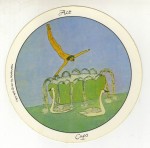(Prologue: I’ve got first-hand experience that a real understanding of the laws of karma can substantially change our lives for the better. I created this weblog to share information and personal experience with others. May it be of benefit!)
I usually buy my perfume in a shop where a profusion of bottles are stored in lighted, sparkling glass cabinets.
But on December 23, 1997, exactly 15 years ago today, I have a rather unusal experience around perfume.
It’s a day like any other day, except that I’m starting a new job. Get up. Get dressed. Eat breakfast. Brush teeth. Put on winter things. Lock door. Go down the wooden stairs and walk north.
About half-way up the block, I notice a bottle of perfume. It’s sitting atop a garbage bag.
Being a lover of perfume, I am immediately attracted to that bottle, especially when I read the name of the perfume. Devachan. It means dwelling of the gods. (Please click here for fuller explanation.)
I am drawn by the juxtaposition of the perfume and the garbage. From ego’s  point of view, it’s sort of like beauty and the beast! Nice and not nice. Attractive and ugly. Pleasant and unpleasant. Sensual and tacky. Sweet and smelly.
point of view, it’s sort of like beauty and the beast! Nice and not nice. Attractive and ugly. Pleasant and unpleasant. Sensual and tacky. Sweet and smelly.
Contemplating this, I realize that perfume and garbage are not really opposites as we conventionally think of them. Nor are they separate from each other. Both these phenomena arise from the same primordial ground, ultimate basic goodness. (Please click here for explanation of term.)
Seems that some entrepreneurs are discovering the same thing: one company is making perfume from garbage. (Please click here for more details.) Chogyam Trungpa Rinpoche used to remind us that whatever comes up is a workable situation. We don’t throw anything out.
After September 11, 2001, the Smithsonian discovered that there is the perfume of garbage. (Please click here for more details.)
I have renamed December 23 Devachan Day. It reminds me that it is I who have created a dualistic world. And that world is reflected back to me everytime I fixate on so-called opposites. It is this fixation that creates karma.
I have never been able to find a bottle of this lovely perfume in any store or garbage bag since 1997.
If you found this post helpful, please share it with a friend. Then consider subscribing to the weblog. Just click on the Subscribe button in the navigation bar and follow one of the three, easy-to-follow instructions. Thank you.

